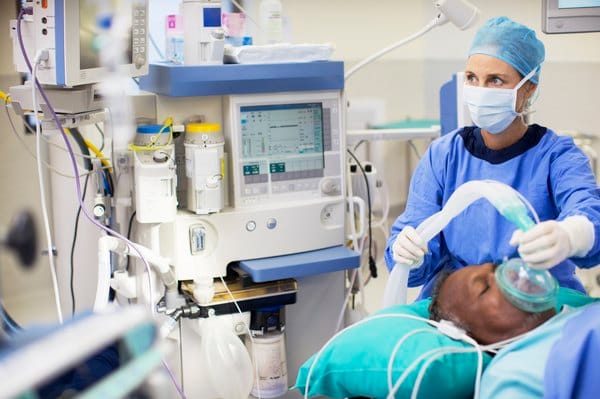You know those amazing doctors who make sure you don’t feel a thing during surgery? They’re called anesthesiologists, and they’re more than just sleep masters. Get ready to uncover some mind-blowing facts about these behind-the-scenes heroes who make surgeries a pain-free experience.
Fun Facts About Anesthesiologists
Ever wonder what those masked figures whispering behind the curtain really do? We’re talking about anesthesiologists – the unsung heroes of the operating room. They’re the reason you don’t feel a thing during surgery (and sometimes forget it even happened!).
Here are some fun facts about these mysterious medical wizards:
- More Than Just Putting You to Sleep: Think anesthesiologists just knock you out? Think again! They’re like vigilant guardians, constantly monitoring your heartbeat, breathing, and other vital signs throughout your entire surgery. They adjust medications, keep you comfortable, and are ready to handle any unexpected hiccups.
- Masters of Pain Relief: Got a fear of needles? Anesthesiologists are like the ninjas of pain relief, armed with a whole arsenal of techniques to keep you comfortable. From nerve blocks that numb specific areas to epidurals that provide long-lasting pain relief, they’ve got a trick up their sleeve for everything.
- Time Travelers (Sort Of): Ever wake up from surgery and wonder where the time went? That’s the magic of anesthesia! While it might feel like you blinked and it was over, your anesthesiologist was working diligently the entire time, ensuring your safety and comfort every step of the way.
- Ultrasound Visionaries: Anesthesiologists don’t just rely on their senses; they have high-tech tools too! They use ultrasound technology, like a superpower, to see beneath the surface of your skin. This helps them place needles precisely for nerve blocks and ensures everything is positioned correctly for a safe and effective procedure.
- Memory Manipulators (Not Really, But Kinda): One of the most intriguing aspects of anesthesia is its effect on memory. While general anesthesia aims for amnesia, it’s not always a complete blackout. Some patients report hazy recollections, snippets of conversations, or even strange dreams. This fascinating area is still being studied, but it definitely adds to the mystique of anesthesiology!
- Behind-the-Scenes Orchestrators: You might not see them in the spotlight, but anesthesiologists are the behind-the-scenes conductors of the operating room. They collaborate closely with surgeons, nurses, and other medical professionals to ensure your well-being is their top priority.
- Always Evolving: The world of medicine is constantly advancing, and anesthesiology is no exception. These dedicated doctors are always researching, learning, and refining their techniques to make procedures even safer and more comfortable.
- Patient Advocates: Anesthesiologists are your biggest advocate in the operating room. They take the time to explain your options, answer any questions you might have, and ensure you feel informed and empowered throughout your surgical journey.
- More Than Meets the Eye: So, next time you think about anesthesiologists, remember they’re more than just the “put-you-to-sleep” doctors. They’re highly trained specialists, vigilant guardians, pain relief experts, and patient advocates all rolled into one. They’re the silent orchestrators of your surgical experience, working tirelessly behind the scenes to make sure you wake up feeling your best.
What Are Some Fun Facts About Anesthesiology?
We’ve already learned a lot about the crucial role anesthesiologists play, but did you know there’s a whole other side to this field filled with fascinating trivia and intriguing insights? Let’s dive into some fun facts about anesthesiology that might just surprise you!
- Anesthesia’s Grand Debut: A Momentous Occasion: Imagine a world without anesthesia, where surgeries were grueling experiences. Thankfully, that changed in 1846 with the first public demonstration of anesthesia using ether. This groundbreaking event revolutionized surgery, paving the way for safer and more humane procedures.
- Dr. William Morton: The Trailblazer Who Changed Everything: Dr. William Morton, often hailed as the “father of anesthesia,” played a pivotal role in introducing anesthesia to the world. His pioneering work with ether established him as a legend in the field.
- Anesthesia Isn’t Always About Falling Asleep: Think anesthesia always equals a deep slumber? Think again! Some anesthesia techniques allow patients to remain awake and aware during procedures while ensuring they don’t feel any pain. It’s like magic but with science!
- Anesthesiologists: The Guardians of Vital Signs: Behind the scenes, anesthesiologists work tirelessly, utilizing advanced monitoring equipment to keep a close eye on a patient’s vital signs. They’re like vigilant guardians, ensuring everything runs smoothly throughout the procedure.
- Pain-Free Childbirth: A Game-Changer for Mothers: Anesthesiologists play an indispensable role in pain management during childbirth, making the experience significantly more comfortable for mothers.
- Our Furry Friends Benefit from Anesthesia Too: Anesthesiologists don’t just care for humans; they extend their expertise to animals as well. They administer anesthesia to animals undergoing surgical procedures, keeping them safe and comfortable throughout.
- Anesthesia and Memory: A Temporary Fog: Ever wondered why some people have hazy memories or vivid dreams after surgery? General anesthesia can sometimes cause temporary memory loss or unusual dreams, but these effects generally fade quickly.
- Anesthesia: Safe and Effective When Done Right: Anesthesia is generally very safe and effective when administered by skilled professionals. Anesthesiologists meticulously assess patients and monitor them closely, minimizing risks and ensuring positive outcomes.
- The Unsung Heroes Working Behind the Scenes: Anesthesiologists often work quietly behind the scenes, ensuring patient comfort and safety while surgeons focus on the intricate details of the procedure.
- Calm Under Pressure: A Must-Have Skill: The operating room can be a high-pressure environment, but anesthesiologists are masters of composure. They make critical decisions with calmness and precision, ensuring the well-being of their patients even in challenging situations.
This list offers just a glimpse into the world of anesthesiology, a field brimming with fascinating facts and ongoing discoveries. It’s a testament to the vital role these medical professionals play in ensuring patient well-being and advancing medical care.
What Is Interesting About Being an Anesthesiologist?
So, we’ve talked about how important anesthesiologists are, but what makes their work so fascinating? It’s not just about putting people to sleep – it’s a whole lot more complex and engaging than that.
Imagine being the guardian of someone’s well-being during one of the most vulnerable moments in their lives. Anesthesiologists are like the pilots of the operating room, navigating the delicate balance between keeping a patient comfortable and ensuring their body can handle the stress of surgery. They’re masters of pharmacology, physiology, and critical care, which means they have a deep understanding of how drugs interact with the body and how to handle any unexpected situations that might pop up.
But it’s not just about technical expertise. Anesthesiologists are also incredibly compassionate individuals. They’re often the first friendly face a patient sees before surgery, and they play a vital role in calming nerves and answering questions.
Some experts even suggest that the role of an anesthesiologist is evolving. With advancements in pain management techniques and a growing emphasis on patient-centered care, anesthesiologists are becoming more involved in pre-operative assessments, post-operative pain control, and even chronic pain management.
Here’s a quick breakdown of what makes being an anesthesiologist so interesting:
| Aspect | Description |
|---|---|
| High Stakes & Critical Decision Making | Anesthesiologists work in high-pressure environments where quick thinking and decisive action can mean the difference between life and death. |
| Problem-Solving & Adaptability | Every patient is different, and anesthesiologists need to tailor their approach based on individual needs, existing medical conditions, and potential complications. |
| Constant Learning & Innovation | The field of anesthesiology is constantly evolving with new medications, technologies, and techniques, requiring anesthesiologists to stay up-to-date with the latest advancements. |
| Human Connection & Empathy | Anesthesiologists build trust and rapport with their patients, providing emotional support and reassurance during stressful times. |
| Making a Tangible Difference | Anesthesiologists play a direct and essential role in positive patient outcomes, knowing their skills contribute to successful surgeries and improved lives. |
It’s important to remember that our understanding of medicine and healthcare is always progressing. What we know today about anesthesiology might be just the tip of the iceberg, and ongoing research will likely lead to even more fascinating discoveries in the future.
What Are 5 Things an Anesthesiologist Does?
Let’s delve a bit deeper into the world of anesthesiologists. While we often associate them with putting us to sleep before surgery, their expertise extends far beyond that.
- Anesthesia Experts: Anesthesiologists are medical detectives in a way. They consider your medical history, age, weight, any medications you’re on, and even allergies to determine the safest and most effective anesthesia plan just for you. Throughout your surgery, they’re constantly monitoring your vital signs – heart rate, breathing, blood pressure – like vigilant guardians ensuring everything is running smoothly.
- Pain Management Ninjas: Anesthesiologists don’t just manage pain during surgery; they’re also experts in tackling pain in general. Whether it’s chronic pain from an old injury or pain management after a major surgery, they have a whole arsenal of techniques at their disposal. From medications and nerve blocks to epidurals, they work to provide relief and improve your quality of life.
- Critical Care Specialists: Anesthesiologists are like the superheroes of the medical world. Their training in critical care medicine means they can handle medical emergencies and manage critically ill patients. You’ll find them using their skills in operating rooms, intensive care units, and even emergency departments.
- Surgical Strategists: Before you go into surgery, your anesthesiologist teams up with your surgeon to create a personalized plan. They review your medical history together, discuss any potential risks related to anesthesia, and make sure everyone is on the same page.
- Educators: Anesthesiologists are passionate about passing on their expertise. They teach future doctors, nurses, and other healthcare professionals about the intricacies of anesthesia and pain management. Many anesthesiologists are also involved in research, always looking for ways to improve patient care and discover new pain management techniques.
To put it simply: Anesthesiologists are much more than just the doctors who put you to sleep. They are highly trained specialists who play a critical role in ensuring your safety and well-being before, during, and after surgery.
What Are Some Interesting Facts About Nurse Anesthetists?
Nurse anesthetists, also known as CRNAs, are like the silent guardians of the operating room. You probably know that they’re the ones who give you the good stuff to make you fall asleep before surgery, but their role goes way beyond that!
One thing that might surprise you is just how much education and training CRNAs go through. We’re talking a minimum of seven to eight and a half years of intense studying! This rigorous education gives them a super-deep understanding of things like pharmacology (that’s the science of how drugs work), physiology (how the body works), and even what to do in emergency situations.
Think of it this way: surgeons might be the architects of an operation, but CRNAs are the master builders, making sure everything runs smoothly from start to finish. They’re constantly monitoring your vital signs, adjusting medications, and basically acting as your personal bodyguard while you’re under anesthesia.
But wait, there’s more! The awesomeness of CRNAs extends beyond the operating room. You can also find them working their magic in pain management clinics and intensive care units.
What Are Some Facts About the First Anesthesia?
Let’s dive a little deeper into those early days of anesthesia. Picture this: back in the day, long before fancy operating rooms, people actually used things like special herbs and even good old wine to try and dull the pain during surgery. It might sound crazy now, but these ancient pain relief methods were the first baby steps towards modern anesthesia.
Now, imagine being known as the “father of anesthesia.” That title goes to a Dr. Crawford W. Long, who, back in 1842, did something absolutely groundbreaking. He used a substance called ether to completely knock out a patient before surgery. This was a monumental moment – it proved that you could actually make surgery painless!
But here’s the thing about anesthesia—it’s not just about making you sleepy during surgery. It also has this amazing ability to make you forget what happened while you were under. It’s like hitting the “delete” button on the whole experience, which is honestly a lifesaver when it comes to dealing with the stress and potential trauma of surgery.
And you know what? Anesthesia didn’t just change the game for patients, it totally revolutionized how surgeons could do their jobs. Before anesthesia, surgeries were these terrifying, brutally painful ordeals. People often died from the shock and pain alone. But with anesthesia, suddenly surgeons could perform complex, life-saving procedures that were impossible before.
What Is So Hard About Anesthesiology?
So, we’ve talked about some of the things anesthesiologists do, but what makes their job so tough? It’s not just about putting people to sleep, that’s for sure! Imagine being responsible for someone’s life while a surgeon operates. Anesthesiologists are like the silent guardians in the operating room, constantly monitoring and adjusting medications to keep patients stable and pain-free.
One of the trickiest parts is that every patient is different. Age, health conditions, even allergies – all these things influence how someone responds to anesthesia. It’s like figuring out a puzzle, and the pieces are always changing. Anesthesiologists need a deep understanding of medicine, especially how different drugs interact within the body.
Think about it, even tiny mistakes in dosage can have huge consequences. That’s a lot of pressure! And it’s not just about technical skills either, anesthesiologists need to be excellent communicators. They’re the ones explaining procedures to patients, often when folks are feeling anxious about surgery. Building trust and providing emotional support is a big part of their job too.
Here’s a glimpse into some of the specific challenges:
| Challenge | Description |
|---|---|
| Precision is Key | Getting the anesthesia dose just right is crucial. Too little, and the patient might wake up mid-surgery. Too much, and it could lead to serious complications. |
| Constant Monitoring | Anesthesiologists are like hawks, watching vital signs like breathing and heart rate throughout the entire procedure, ready to adjust medications as needed. |
| Emergency Situations | Surgeries can take unexpected turns. Anesthesiologists need to think fast and act decisively to manage any complications that arise. |
| Ethical Decisions | Sometimes, difficult choices need to be made, like how to manage pain for patients with complex medical histories. It’s a delicate balance of expertise and empathy. |
It’s important to note that anesthesiology is always evolving. New medications and techniques are constantly being developed. This means anesthesiologists have to be lifelong learners, always staying up-to-date on the latest advancements.
So, when we think about the challenges in anesthesiology, we realize it’s more than just technical expertise. It’s a demanding field that requires a unique blend of scientific knowledge, critical thinking, and compassion.
What Are the Good Things About Anesthesia?
We’ve all heard about anesthesia as that thing that knocks you out before surgery, but it does so much more! It’s not just about falling asleep; it’s about making sure you don’t feel a single ounce of pain during the whole process. And the best part? For many, it can even make those post-surgery memories a little fuzzy, sparing you from reliving any uncomfortable moments.
Anesthesia is a real team player when it comes to your health. It works behind the scenes to keep your heart rate steady and your breathing in check, which is super important for avoiding complications during and after surgery.
Now, some folks might have heard whispers about the risks of anesthesia. And while it’s true that, like any medical procedure, there are potential side effects, serious problems are actually pretty rare. Doctors and nurses are highly trained in administering anesthesia and closely monitor patients throughout the entire process.
Does General Anesthesia Feel Like a Blink?
So, you’re curious about what it’s like to go under? You see, when you get general anesthesia, it’s like a special sleep brought on by medications given through your veins and a mask you breathe through. This sleep makes sure you don’t feel a thing during surgery. But what’s it really like when the lights go out?
For some lucky ducks, it really is like a blink! One moment their eyes are closed, the next, poof! Surgery’s done. But for others, it’s more like slowly drifting off to dreamland. Some people even say they feel kinda happy and floaty right before they’re out.
However it goes down, rest assured that general anesthesia is super safe and works like a charm.
Think of it this way:
| What it does | Why it matters |
|---|---|
| Makes you totally unaware | No pain during surgery, yay! |
| Relaxes your muscles | Helps the surgeons work easier |
| Lets you sleep through it | No memory of the surgery afterward |
Scientists are still trying to fully understand how general anesthesia works its magic on our brains. It’s a bit of a mystery! But one thing’s for sure – it’s a game-changer for modern medicine.
How Many Times Is It Safe to Go Under Anesthesia?
We’ve already covered a bit about anesthesia, but now let’s dive into a question that pops up a lot: How many times can you safely go under?
The short answer is: it depends. Think of it like a video game character – everyone starts with different stats. Your age, how healthy you are, and even the type of anesthesia used all play a part in determining what’s safe for you.
Younger, healthier folks tend to handle anesthesia better and more often. Someone who’s older or managing health conditions might have a lower threshold.
Then there’s the type of anesthesia. General anesthesia, the kind that puts you completely out, might carry slightly more risk than regional anesthesia, which just numbs a specific area.
Don’t be afraid to chat with your doctor about this! They can walk you through the potential risks and benefits based on your unique situation.
What Is It Called When Anesthesia Doesn’t Work?
So, you’re prepped for surgery, the anesthesiologist does their thing, and… nothing. You don’t drift off as expected. This is what we call anesthesia resistance. Basically, your body’s playing a bit of a rebel, refusing to succumb to the sleep-inducing effects of the medication.
Now, why does this happen? Well, it’s a bit of a mystery sometimes. Our bodies are complex, and what works like a charm for one person might not for another. It could be down to your genes, certain medical conditions you might have, or even other medications you’re taking that mess with the anesthesia.
The good news is, anesthesiologists are pretty amazing at what they do. They’ll closely monitor your responses and can quickly adjust the type or dosage of the anesthesia if they see it’s not having the desired effect. Sometimes, they might even need to explore alternative pain management options, ensuring you’re comfortable and pain-free throughout the procedure.
Now, there’s another term you might have heard: anesthesia awareness. It’s a rare but scary thought – waking up mid-surgery. The good news is, with today’s advanced monitoring techniques and highly skilled anesthesiologists, the chances of this happening are incredibly slim.
Think of those monitors as your very own team of silent guardians, keeping a constant watch over your vital signs, ensuring you’re deeply asleep and oblivious to the surgical symphony happening around you.
While the world of anesthesia is constantly evolving, and research is ongoing, understanding the basics and potential hiccups can help ease any anxieties you might have about your upcoming procedure. Remember, communication is key! Don’t hesitate to discuss any concerns or questions you have with your medical team.
Are you curious about Mount Kilimanjaro? We have some fun facts for you to discover. fun facts about mount kilimanjaro
- Sept 31 Myth: Unveiling Calendar Secrets - March 18, 2025
- How Long & Till December 18, 2025: Accurate Countdown Guide - March 18, 2025
- Discover Japanese Artists: A Complete History - March 18, 2025
















